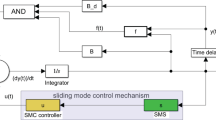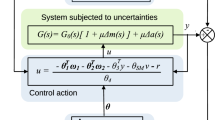Abstract
A basic introduction to the fully actuated system (FAS) approaches for discrete-time systems with delays is given. Firstly, general dynamical discrete-time FAS models with time-varying state delays and constant input delays are proposed. The FAS models are classified into affine ones and non-affine ones, and also ones with and without interconnections. Secondly, controllers for such FASs are designed, which result in constant linear closed-loop systems with arbitrarily assignable eigenstructure. Different from the case of FAS with state delays only, the controller for a discrete-time FAS with an input delay involves a prediction scheme which is constructed based on the open-loop system. The contribution of this paper has laid a fundamental basis for FAS approaches to discrete-time delay systems, and further specific analysis and design problems can be established similar to the continuous-time system case.
Similar content being viewed by others
References
Xu S, Lam J. A survey of linear matrix inequality techniques in stability analysis of delay systems. Int J Syst Sci, 2008, 39: 1095–1113
Fridman E. Introduction to Time-delay Systems: Analysis and Control. Berlin: Springer, 2014
Zhou B. Truncated Predictor Feedback for Time-delay Systems. Berlin: Springer, 2014
Gu K, Niculescu S I. Survey on recent results in the stability and control of time-delay systems. J Dyn Syst Meas Control, 2003, 125: 158–165
Mahmoud M S. Robust Control and Filtering for Time-delay Systems. Boca Raton: CRC Press, 2018
Zhang X M, Han Q L, Seuret A, et al. Overview of recent advances in stability of linear systems with time-varying delays. IET Control Theor Appl, 2019, 13: 1–16
Chen Y, Wang Z. Local stabilization for discrete-time systems with distributed state delay and fast-varying input delay under actuator saturations. IEEE Trans Automat Contr, 2021, 66: 1337–1344
González A. Robust stabilization of linear discrete-time systems with time-varying input delay. Automatica, 2013, 49: 2919–2922
González A, García P. Output-feedback anti-disturbance predictor-based control for discrete-time systems with time-varying input delays. Automatica, 2021, 129: 109627
Gonzalez A, Sala A, Albertos P. Predictor-based stabilization of discrete time-varying input-delay systems. Automatica, 2012, 48: 454–457
He Y, Wu M, Liu G P, et al. Output feedback stabilization for a discrete-time system with a time-varying delay. IEEE Trans Automat Contr, 2008, 53: 2372–2377
Zhang H, Xie L, Duan G. H ∞ control of discrete-time systems with multiple input delays. IEEE Trans Automat Contr, 2007, 52: 271–283
Hou T, Liu Y Y, Deng F Q. Stability for discrete-time uncertain systems with infinite Markov jump and time-delay. Sci China Inf Sci, 2021, 64: 152202
Liu M Q. Unified stabilizing controller synthesis approach for discrete-time intelligent systems with time delays by dynamic output feedback. Sci China Ser F-Inf Sci, 2007, 50: 636–656
Xiao F. A new approach to consensus problems in discrete-time multiagent systems with time-delays. Sci China Ser F-Inf Sci, 2007, 50: 625–635
Sun J, Chen J. A survey on Lyapunov-based methods for stability of linear time-delay systems. Front Comput Sci, 2017, 11: 555–567
Duan G R. High-order system approaches: I. Full-actuation and parametric design (in Chinese). Acta Automatica Sin, 2020, 46: 1333–1345
Duan G R. High-order system approaches: II. Controllability and fully-actuation (in Chinese). Acta Automatica Sin, 2020, 46: 1571–1581
Duan G R. High-order system approaches: III. Observability and observer design (in Chinese). Acta Automatica Sin, 2020, 46: 1885–1895
Duan G R. High-order fully actuated system approaches: part I. Models and basic procedure. Int J Syst Sci, 2021, 52: 422–435
Duan G R. High-order fully actuated system approaches: part II. Generalized strict-feedback systems. Int J Syst Sci, 2021, 52: 437–454
Duan G R. High-order fully actuated system approaches: part III. Robust control and high-order backstepping. Int J Syst Sci, 2021, 52: 952–971
Duan G R. High-order fully actuated system approaches: part IV. Adaptive control and high-order backstepping. Int J Syst Sci, 2021, 52: 972–989
Duan G R. High-order fully actuated system approaches: part V. Robust adaptive control. Int J Syst Sci, 2021, 52: 2129–2143
Duan G R. High-order fully-actuated system approaches: part VI. Disturbance attenuation and decoupling. Int J Syst Sci, 2021, 52: 2161–2181
Duan G R. High-order fully actuated system approaches: part VII. Controllability, stabilisability and parametric designs. Int J Syst Sci, 2021, 52: 3091–3114
Duan G R. High-order fully actuated system approaches: part VIII. Optimal control with application in spacecraft attitude stabilisation. Int J Syst Sci, 2022, 53: 54–73
Duan G R. High-order fully-actuated system approaches: part IX. Generalised PID control and model reference tracking. Int J Syst Sci, 2022, 53: 652–674
Duan G R. High-order fully actuated system approaches: part X. Basics of discrete-time systems. Int J Syst Sci, 2022, 53: 810–832
Ge S S, Li G Y, Lee T H. Adaptive NN control for a class of strict-feedback discrete-time nonlinear systems. Automatica, 2003, 39: 807–819
Ge S S, Yang C, Dai S L, et al. Robust adaptive control of a class of nonlinear strict-feedback discrete-time systems with exact output tracking. Automatica, 2009, 45: 2537–2545
Ge S S, Yang C, Lee T H. Adaptive robust control of a class of nonlinear strict-feedback discrete-time systems with unknown control directions. Syst Control Lett, 2008, 57: 888–895
Xu W, Liu X, Wang H, et al. Observer-based adaptive neural network output-feedback control for nonlinear strict-feedback discrete-time systems. Int J Control Autom Syst, 2021, 19: 267–278
Acknowledgements
This work was partially supported by Fundamental Science Center Program of National Natural Science Foundation of China (Grant No. 62188101), Major Program of National Natural Science Foundation of China (Grant Nos. 61690210, 61690212), National Natural Science Foundation of China (Grant No. 61333003), and Self-Planned Task of State Key Laboratory of Robotics and System (HIT) (Grant No. SKLRS201716A). The author is grateful to his Ph.D. students Guangtai TIAN, Qin ZHAO, Xiubo WANG, Weizhen LIU, Kaixin CUI, Liyao HU, and Prof. Y. CUI, for helping him with reference selection and proofreading. His particular thanks go to his student Tianyi ZHAO for his help in working out the examples.
Author information
Authors and Affiliations
Corresponding author
Rights and permissions
About this article
Cite this article
Duan, G. Discrete-time delay systems: part 1. Global fully actuated case. Sci. China Inf. Sci. 65, 182201 (2022). https://doi.org/10.1007/s11432-021-3417-3
Received:
Revised:
Accepted:
Published:
DOI: https://doi.org/10.1007/s11432-021-3417-3




